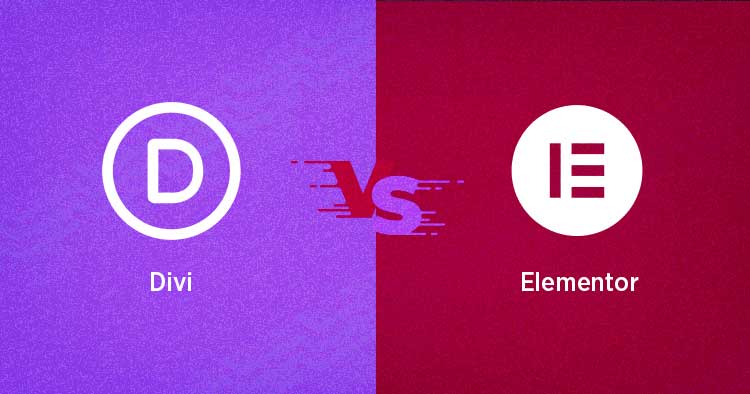
Gone are the days when people had to solely rely on developers to build their websites and pay hefty amounts to get their required designs. WordPress page builders have cleared these obstacles and enabled laypeople to play with simple drag and drop editing to translate the designs in their minds into reality.
Among these best WordPress page builders, both Divi and Elementor have registered top spots, thanks to their extensive features offering and ease of use. However, users often find themselves struggling to make the right selection due to the excellence of both page builders.
I am here to knock the confusion away as my blog compares Divi and Elementor on various metrics and will help you choose the right page builder to cater to your specific requirements.
Before starting the Divi vs. Elementor duel, let us walk through their basic introduction. If you already possess the basic knowledge of page builders, skip this portion to read the comparison part directly.
Why Do You Need a Page Builder?
A few years back, web developers held the pride of developing and building websites, and the thought of a non-tech-savvy user trying their hands on page building was considered a joke.
Fast forward to recent times, a WordPress plugin turned the tables and put the control and power in the hands of the same non-tech-savvy users, giving them the independence of building their own pages without dealing with any coding complexities.
The magical trend changer plugin is known as a page builder. A page builder cuts down the time and effort and allows users to structure and design their page without any coding skills. But how is this possible?
WordPress page builder makes website building possible for every user thanks to its easy drag-and-drop visual editing that only needs the user to have a creative mindset.
So, are these page builders only for non-tech-savvy users? No, coders can use these page builders to their maximum potential by making the desired changes to the existing code and save their time, effort, and money via drag-and-drop editing.
Now that you know about page builders let’s learn the basics of our two contenders for the best WordPress builder position; Divi and Elementor.
Divi Page Builder
Divi is a WordPress plugin offered by Elegant Themes, and like every page builder, it is used to build web pages via easy drag-and-drop visual editing. It offers tens of free layout templates and 46 premade modules that allow the users to add drag and drop elements like contact forms, shops, image sliders, etc., to their websites.
Divi is offered in the following two forms:
- Backend Builder
- Frontend Visual Builder
Build Webpages Without Any Coding Difficulties
Launch Divi on Cloudways with 1-Click to build astonishing websites with ease on the best cloud hosting provider
As the name suggests, the Divi backend builder works on the backend interface and replaces the standard WordPress post editor. Made for users who are acquainted with coding to make instant changes from the dashboard.

Since the WordPress page builders are mainly made to cater to the needs of technophobes, Divi’s frontend visual builders help such users in the best way possible with easy visual drag and drop editing.
As you add something or change any settings in the frontend builder, the results instantaneously appear on the screen, helping users make the desired changes easily and quickly.
Elementor Page Builder
Elementor, like Divi, is a WordPress drag-and-drop visual page builder. Wearing the tag of the first WordPress page builder, Elementor sets itself apart from other page builders due to its extensive features, responsiveness, and ease of use.
Built for all types of users, Elementor does not limit itself to novice users but also facilitates professional users in creating better websites.

With dozens of widgets and a one-of-a-kind template library, coupled with easy dragging and dropping, users can work with Elementor without technical hassles or coding difficulties.
Working on the WYSIWYG (What You See Is What You Get) design, the visual elements cut down the time and efforts in traditional website building and allow you to create any content layout or page layout. It offers a separate interface and replaces the boring WordPress block editor to work on your posts in a modern and improvised manner.
What Makes Divi and Elementor Different?
Even though both Elementor and Divi are the leading page builders, the fact that no plugin can be perfect as some lackings accompany every tool remains intact.
While Divi is a visual page builder, it gets a bit complicated for novice users at times, whereas Elementor is quite easy to learn even for new users. That said, Divi’s customization options and breathtaking templates give Elementor a tough time.
The most notable difference between Elementor and Divi is the popup builder tool that Elementor offers, but Divi lacks.
Elementor’s popup builder lets you use the interface for designing popups and show them on your pages at any place. Although Divi tries to fill the gap with third-party overlays, it isn’t as functional as Elementor’s popup builder.

Thinking of picking Elementor due to its better offerings? Don’t jump the gun. More surprises are waiting in this blog, like Divi’s built-in AB testing feature that helps optimize designs.
Divi’s A/B tests give you a picture of how the images, headlines, buttons, and other variants will perform on the page, which is quite helpful in designing landing pages.

Like Divi tackles Elementor’s popup builder with a third-party solution, Elementor does the same with a third-party tool like Google Optimize, which helps design optimization.
Elementor offers a gigantic third-party marketplace for extensions; Divi can’t match that. However, Divi being both a plugin and a theme offers better page builder and theme synchronization.
So which one is the better page builder? The battle continues as I compare the players alongside different parameters. I will choose an individual winner for each category and conclude with a final winner by combining the results.
Divi vs Elementor: Features Comparison
Sure page builders make it easy to build and design websites. But, what’s a cake without any sprinkles? Plain and dull.
Features play the role of sprinkling and further easing down the process. Users naturally select the tools equipped with the most useful features, and same is the case with WordPress page builders.
Since both Elementor and Divi focus on solving similar problems, their features are somewhat identical. But which one offers the better features? I will compare them against similar features to come to a fair conclusion.
Ease of Use
Perhaps a page builder’s most important feature is its user-friendliness. No one likes to work in a complicated environment and confusing elements that entangle the page-building process rather than simplifying things.
Both Elementor and Divi focus on this very aspect and thankfully stand well against their claims of ease of use and can easily be used by newbies.
Users love Divi’s drag and drop editing, enriched with the latest features. However, lately, Divi has drifted more towards fancying the looks, comprising a bit of user-friendliness. A user may have to figure out a couple of things to work smoothly with its extensive features.
Elementor also offers an easy-to-use drag and drop editor and, like Divi, does not require you to be a coder. Even though Elementor also provides excellent features, it has not compromised on its user-friendliness and has maintained its simplicity. A novice user can easily use Elementor and be facilitated with its keyboard shortcuts and easy handling.
Also, some users have reported shortcodes mess with Divi, but Elementor hasn’t gotten any such problems so far.
Winner: Elementor (Simplistic and intuitive design)
Responsiveness
Imagine working with a page builder that takes a pause to respond to your commands—agonizing!!! Responsiveness is one of the most important features for a page builder, and any builder lacking this gets rejected by the users.
Divi and Elementor both provide highly responsive environments and help to create responsive designs. You won’t find any lags, and your designs will work automatically on all devices.
Since both are the leading players, they offer you to customize your design’s responsive settings as you can set the font sizes, margins and show/hide any modules on your visitor’s devices.
Winner: DRAW
Visual Interface
Divi and Elementor offer the drag and drop visual editing experience, which requires you to simply click an element and drag it to your screen.
With the simple copy-pasting technique, you can build your pages and entire website without dealing with a single line of code. The live editing allows you to see what your visitors will see when they visit your website.
Let’s learn more about the visual interface of each builder:
Divi
Divi provides its users with a full-width editor without any fixed interface elements. Its elements are displayed on the page layout’s right side.
All you have to do with Divi is just select the element you want to add and drag it to your page at the desired position.

Divi also allows its users to enjoy additional elements from the modules. The different colors show different types of modules.
You can use the settings popup to configure the modules, resize the popup and move it anywhere by dragging it. Divi allows you to add new text and change its font, size, and style. All editing happens to live, so you get an idea of what your users will see.
Elementor
Elementor provides you with the design elements on the left-hand column; you can select the elements of your choice and drag and drop them on any part of your page. It is quite convenient as the fixed sidebar provides a controlled editing experience.

Like Divi, Elementor allows the user to perform visual editing, displaying the instant changes that they make to their page’s design. Overall, Elementor’s visual interface is quite good but is a bit less handy than Divi’s visual interface.
Winner: Divi
Theme Building
Elementor and Divi are not just page builders but also provide the theme building feature, which means that you can now create your own WordPress theme via easy drag-and-drop editing.
Divi did not have this feature until its 4.0 version; Elementor had released this feature first. You can use Divi and Elementor’s theme builders to build templates for your posts, footer, header, and archive pages.
Divi allows you to arrange various theme template sections via its backend interface. Users can use Divi’s frontend visual builder to build the template sections of your theme and create new templates to override their existing site’s header, footer, and design.
Choose where you want to apply your template, and start building the template for your website.

Elementor enables its users to design their theme templates by directly accessing the visual builder. It offers dedicated widgets for the templates and a dynamic content feature that can be applied to any widgets.

With Elementor, you can create templates for sections, header, footer, pages, posts, and archives. Elementor theme builder is quite robust and offers excellent flexibility.
Winner: DRAW
SEO Friendliness
At the end of the day, everything drops down to ranking. Who doesn’t want their website to rank better on search engines and gain traffic? Not a single sane person. Your page builder, along with the other features, should also focus on the SEO aspects of your site.
Sure, you don’t have to deal with coding with the usage of page builders, but do you know that shortcodes back all dedicated functions? A plethora of shortcodes is bad for your site’s SEO, and the more functionalities and features in a WordPress plugin, the more shortcodes you will have on your website.
Elementor understands the shortcode issue and hence focuses on clean code. Considered one of the most SEO-friendly builders, it follows the strict code standard to ensure fast loading speeds. You can optimize your pages even further by using external plugins like Yoast.
Divi, on the other hand, is not so good with limiting shortcodes. The high amount of shortcodes contributes to affecting your site’s SEO. Although Divi offers fast loading times, its shortcodes can become a real problem because even when you uninstall Divi; the annoying codes may remain and affect your overall website.
Winner: Elementor
Note: I have also compared some of the other leading page builders; check out how they perform against each other.
Divi vs Elementor: Pricing and Plans
If a page builder offers extensive features, is user-friendly, fast, responsive, and has all the elements you need but is overpriced and way out of your budget, then it’s useless for you.
Everything comes down to the pricing plans and your budget. Of course, you should never be a cheapskate and only go for the cheaper solution with closed eyes and open arms. A smart user analyzes the builder’s features and checks if it falls under their budget or not.
Elementor and Divi are budget-friendly page builders and provided with their benefits; they are EXCELLENT value for the money they charge.
Think of the costs you will save on hiring developers, designers, plus other products and maintenance. A page builder cuts down all these expenses at the cost of a subscription. So, they are totally worth your money.
We will check out Divi and Elementor’s pricing plans separately and decide a winner at the end of this section.
Divi Pricing
Divi offers two pricing plans to its users. The first one is the yearly plan that costs $89/year, and the other one requires the user to pay a one-time fee of $249 and enjoy using Elegant theme’s services for a lifetime.
Both plans allow the subscribers to not only get the Divi page builder but have full access to their entire product range.

Additionally, you will get loads of layout packs that you may use to beautify your websites. Also, you will get access to all products and 24/7 premium support in case you need any help.
The best thing about Divi’s pricing plan is that it allows you to use the plugins and themes on unlimited websites, so you have the freedom of deployment. To top it off, you get a no-questions-asked 30-day money-back guarantee, so you may make a risk-free purchase.
Elementor Pricing
Elementor is more expensive than Divi, but it tries to balance the difference by offering its free version. Needless to say, the free version comes with extremely limited options and entices the user into buying paid versions.
The biggest and perhaps the only complaint that is repeated with Elementor is its high price, which is somehow justified considering the features, and performance it delivers. Elementor’s pricing plans are displayed in the image below:

Winner: Divi
Final Decision – Divi or Elementor?
I compared Divi and Elementor over six different metrics, and the results are as follows:
- Ease of Use: Elementor
- Responsiveness: DRAW
- Visual Interface: Divi
- Theme Building: DRAW
- SEO Friendliness: Elementor
- Pricing: Divi
Total Elementor wins: 2
Total Divi wins: 2
Draw: 2
Divi and Elementor are both excellent WordPress page builders, and their selection is based on your usage. While Divi may cater to some people’s needs, it may fail to satisfy others, and the same goes with Elementor.
I have remained unbiased in this review, and as per my analysis, both page builders are exceptional in their functionalities, resulting in a DRAW. Even though I have declared my result, I leave the doors of judgment open to all my readers to decide their winner, so let me know your choice in the comments below.
Which is better: Elementor vs Divi?
Both Elementor and Divi are excellent page builders and have their pros & cons. While Divi is a more affordable page builder, Elementor is unmatched in its user-friendliness and performance.
Is Elementor faster than Divi?
Yes, Elementor is faster than Divi due to its code cleanliness and clear organization. Divi is also a fast page builder but falls a little short when compared to Elementor.
Should I use Elementor or Divi?
If you are looking for a cheaper WordPress page builder, then you should use Divi. If you prioritize performance and user-friendliness overpricing, then you should opt for Elementor.
Is Elementor the same as Divi?
No, even though Elementor and Divi are both WordPress page builders and offer similar features, they are different. Both are user-friendly and responsive page builders. Elementor has the edge over Divi in terms of ease of use, but Divi is cheaper than Elementor.
Sarim Javaid
Sarim Javaid is a Sr. Content Marketing Manager at Cloudways, where his role involves shaping compelling narratives and strategic content. Skilled at crafting cohesive stories from a flurry of ideas, Sarim's writing is driven by curiosity and a deep fascination with Google's evolving algorithms. Beyond the professional sphere, he's a music and art admirer and an overly-excited person.

